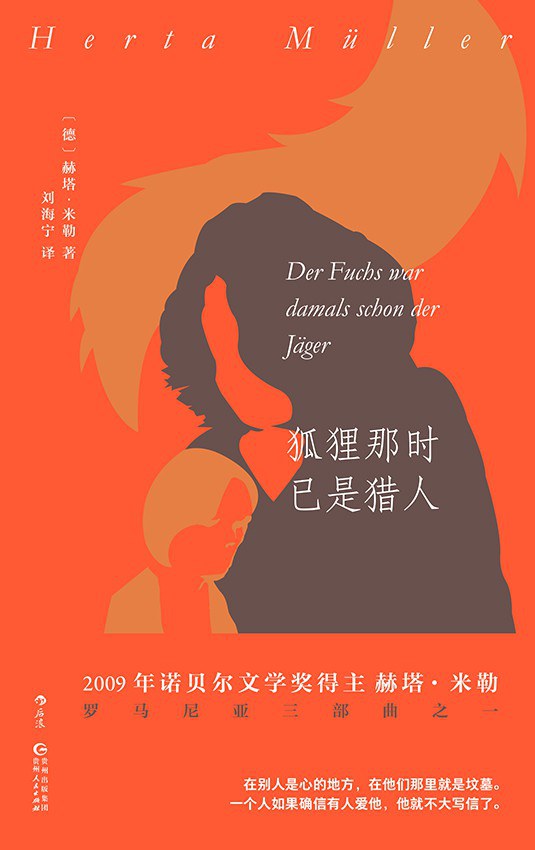1
/
of
1
The fox was already the hunter
The fox was already the hunter
[Germany] Herta Müller Liu Haining 译
Regular price
$17.99 USD
Regular price
$17.99 USD
Sale price
$17.99 USD
Unit price
/
per
Low stock
Couldn't load pickup availability
About Book
About Book
The first of Herta Müller's Romanian trilogy, a novel written in a distinctively poetic language, tells the story of the shattered life of a dictatorship. Thirty-two scenes depict Romanian history. Synopsis: Set in turbulent Romania, two friends, Adina and Clara, gradually develop a friendship that eventually breaks down. The nonlinear plot structure and poetic language lend the novel a somewhat unfocused quality, but beneath the surface of this chaotic, rambling, and obscure text lies the author's profound sentiments.
♝Editor's Recommendation◎ Herta Müller, winner of the 2009 Nobel Prize in Literature, was born in a German-speaking village in Romania. She depicts the plight of displaced people with the conciseness of poetry and the straightforwardness of prose, and through the silent act of writing, she gives dignity to the weak.
◎ Precise imagery and concise language accurately depict the atmosphere of life in Romania at that time, comparable to the movie "The Lives of Others".
In turbulent Romania, the friendship of two best friends, Adina and Clara, is in jeopardy because of the latter's boyfriend. Every day when Adina comes home from get off work, she finds the tail of her fox fur in her bedroom is shortened...
♝Media Recommendation A dark collage, full of fear and beauty… Poetic and forthright, Herta Müller’s prose acts like a prism, shattering and illuminating a world that is always watching and waiting.
—The Atlantic Monthly
The narrative has a cinematic intensity… short phrases that accumulate and overlap, forming a cacophonous symphony as a whole.
——The Times Literary Supplement
Herta Müller's voice was filled with anger and vibrated on the page.
—The Boston Globe
♝2009 Nobel Prize in Literature "For her captivating poetry, with its eloquent simplicity and prose, she depicts the landscape of life in a displaced population."
But to ensure our own existence, we still need these objects, these gestures, these words. After all, the more words we can master, the freer we are. Even if our mouths are silenced, we can still try to assert our rights through gestures and even objects. They are more difficult for censors to decipher, taking time to alert them. And in that long period of time, they transform the humiliation we suffer into another form of dignity.
——Nobel Prize in Literature Acceptance Speech
♝Editor's Recommendation◎ Herta Müller, winner of the 2009 Nobel Prize in Literature, was born in a German-speaking village in Romania. She depicts the plight of displaced people with the conciseness of poetry and the straightforwardness of prose, and through the silent act of writing, she gives dignity to the weak.
◎ Precise imagery and concise language accurately depict the atmosphere of life in Romania at that time, comparable to the movie "The Lives of Others".
In turbulent Romania, the friendship of two best friends, Adina and Clara, is in jeopardy because of the latter's boyfriend. Every day when Adina comes home from get off work, she finds the tail of her fox fur in her bedroom is shortened...
♝Media Recommendation A dark collage, full of fear and beauty… Poetic and forthright, Herta Müller’s prose acts like a prism, shattering and illuminating a world that is always watching and waiting.
—The Atlantic Monthly
The narrative has a cinematic intensity… short phrases that accumulate and overlap, forming a cacophonous symphony as a whole.
——The Times Literary Supplement
Herta Müller's voice was filled with anger and vibrated on the page.
—The Boston Globe
♝2009 Nobel Prize in Literature "For her captivating poetry, with its eloquent simplicity and prose, she depicts the landscape of life in a displaced population."
But to ensure our own existence, we still need these objects, these gestures, these words. After all, the more words we can master, the freer we are. Even if our mouths are silenced, we can still try to assert our rights through gestures and even objects. They are more difficult for censors to decipher, taking time to alert them. And in that long period of time, they transform the humiliation we suffer into another form of dignity.
——Nobel Prize in Literature Acceptance Speech
Publication Date
Publication Date
2021-04-01
Publisher
Publisher
贵州人民出版社
Imprint
Imprint
Houlang, Houlang Literature
Pages
Pages
304
ISBN
ISBN
9787221161765
share

